-
No-Code
Platform
-
Studio
No-code agentic platform delivering the fastest time-to-value and the highest ROI
-
Studio
-
AI-Native CRM
CRM
-
AI-Native CRM
New era CRM to manage customer & operational workflows
CRM Products -
AI-Native CRM
- Industries
- Customers
- Partners
- About
What Are the 3 Types of CRM and Which Is the Best for Your Business?
Updated on
July 19, 2024
11 min read
Ai-Native CRM: The New Era of CRM. Ready to Act

Building sincere and long-lasting customer relationships is the cornerstone of successful businesses in today's dynamic market. Companies that excel at providing exquisite customer experience are the true winners. At the source of their success lies a robust Customer Relationship Management (CRM) system, an indispensable tool designed to streamline and enhance client interactions.
However, when it comes to CRM, there are no one-size-fits-all solutions as the effectiveness of these systems largely depends on the specific needs and nature of the business. In this article we delve into different types of CRM systems, describing the three main systems that respond to various requirements.
From Collaborative to Operational and Analytical CRMs, each type has its purpose in managing customer relationships and business processes. You need to realize that the CRM type you choose can significantly impact the ability to connect with your customers, streamline operations, and drive revenue growth. That’s why it’s crucial to choose the one best suited for your business and its unique needs.
What Is CRM?
CRM, or Customer Relationship Management, helps businesses connect with their clients and deliver the best customer experience based on a personalized approach. It’s designed to improve how you engage with your clients by putting them at the heart of your business operations.
CRM is a strategic tool that uses the latest technologies to manage and analyze customer data. Consequently, creating a more personalized and efficient relationship between the company and its clientele. It’s a centralized hub where you can store and access all of the information about your customers including their contact details, purchase history, and interactions with your company. And as much as 74% of companies that use CRM technology say it gives better access to customer data.
Thanks to this data you can understand your customers’ needs and preferences to create a personalized experience while tailoring your offer and communication strategies to individual clients.
3 Types of CRM
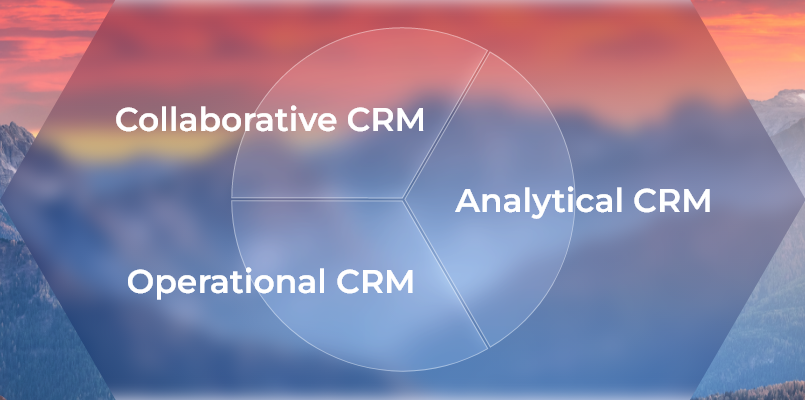
Today’s business world is more competitive and fast-paced than ever before. The ability to create and maintain genuine connections with customers is crucial.
Creating positive relationships with customers is intricate and depends on various factors. An effective CRM system can help with this challenging task, but it must be tailored to the unique needs and dynamics of your business.
There are three types of CRM that have their distinct function and roles in shaping how you connect with your clients. In this part of the article, we will explore the main functionalities and benefits of each type: Collaborative, Analytical, and Operational CRM. Keep reading to find out how each of them can fit into your objectives and help you achieve your business goals.
Collaborative CRM
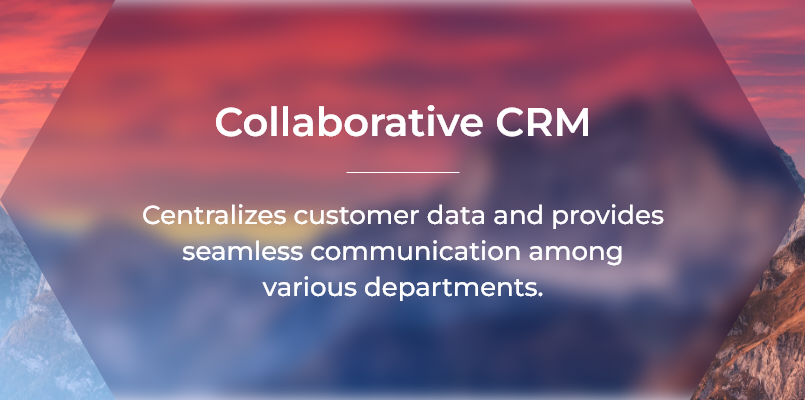
Interactions with clients are multifaceted and positive customer experience is not solely dependent on the sales or marketing teams. It’s the collaboration of the whole company that influences how businesses connect with their customers. Unfortunately, different departments often work independently and are disconnected from each other. To ensure a smooth customer experience at every stage of their journey, it's essential to share information seamlessly across the entire organization, in real time.
Collaborative CRMs not only promote communication and collaboration across the whole organization to improve customer relationships but also compile all of the data in a simple-to-use system. The key is to create a unified front for delivering exceptional customer experiences. You can achieve it by providing your teams with access to up-to-date customer data in an easy-to-navigate system.
How does Collaborative CRM work?
Collaborative CRMs focus on streamlining workflows and ensuring every department within your company has access to the same customer data. It helps to establish seamless interaction among teams, allowing them to share information and coordinate efforts. By implementing a collaborative CRM your client-facing teams will have access to consistent and up-to-date customer data across the whole organization.
Benefits of Collaborative CRM
Collaborative CRM helps create a consistent customer experience across all interactions thus improving customer satisfaction. It saves your clients’ time and effort as they don’t need to repeat themselves when contacting your sales or customer support teams. Each employee they talk to can quickly check the record of all past interactions with specific clients to access all of the important details. Not only does it improve customer experience but it also contributes to increased retention and loyalty as you create a strong and organized bond with your clients.
Who is Collaborative CRM for?
Collaborative CRM is especially beneficial for businesses with complex customer interactions that span multiple touchpoints and involve various departments. It’s also a great solution for enterprises that interact with many clients at the same time or need more time and contact points to finalize the transaction.
If your clients interact with your business on many independent platforms and devices you need a centralized database provided by Collaborative CRM to keep up. This type of CRM encourages team collaboration, facilitates smooth communication, and ensures a unified approach to customer engagement.
Analytical CRM
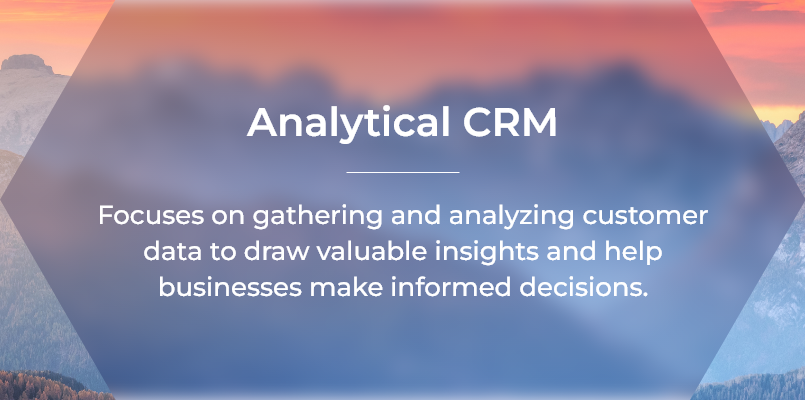
Analytical CRM is the data powerhouse of customer relationship management. It gathers, processes, and analyzes customer data to display valuable insights that you can use to improve the client experience. This type of CRM empowers you to make informed data-driven decisions based on comprehensive analytics. Ultimately, it enhances strategic planning and helps you understand your customers better.
How does Analytical CRM work?
Analytical CRM relies on advanced analytical tools to process and interpret large amounts of customer data. Something that would be very difficult to do manually. It can have a huge impact on creating valuable relationships with your customers, so it’s pertinent to implement it in your business.
The CRM analyzes customer behaviors, preferences, shopping, and web browsing patterns to provide actionable insights. Analytical techniques used by this type of CRM can help you anticipate customer needs, identify trends, and make informed decisions to enhance your business strategies.
Benefits of Analytical CRM
The benefits of Analytical CRM extend beyond data analysis. What’s important is what you can achieve thanks to the data obtained from the CRM. For example, by using this information, you can create more targeted marketing campaigns, personalize customer interactions, optimize product offerings based on customer preferences, and much more. There’s no better way to earn your clients' loyalty than to personalize their offers and communication to whatever they prefer. This way you’re creating a sense of understanding between stakeholders. What’s even more important, you’re showing that you care about their needs.
Additionally, by identifying emerging trends and opportunities, Analytical CRM can help you develop proactive strategies that will help you keep up with the dynamic market changes. Agility and quick adaptation to new circumstances are crucial in the ever-evolving business environment. Analytical CRM not only empowers you with data-driven insights but also equips your business to stay ahead of the curve.
Who is Analytical CRM for?
Analytical CRM is ideal for businesses that prioritize data-driven decision-making. It is especially beneficial for mid-sized to large enterprises with extensive customer data sets. Analyzing large amounts of data without a specialized tool is an impossible task and a waste of time and resources. Instead of dedicating the time of dozens of employees to manually collect and analyze customer data, it’s more efficient and effective to benefit from investing in CRM tailored to your needs.
Suppose you want to gain a deeper understanding of customer behavior, improve targeting strategies, and refine your overall approach to customer engagement. In that case, Analytical CRM is the right choice for your business.
Operational CRM
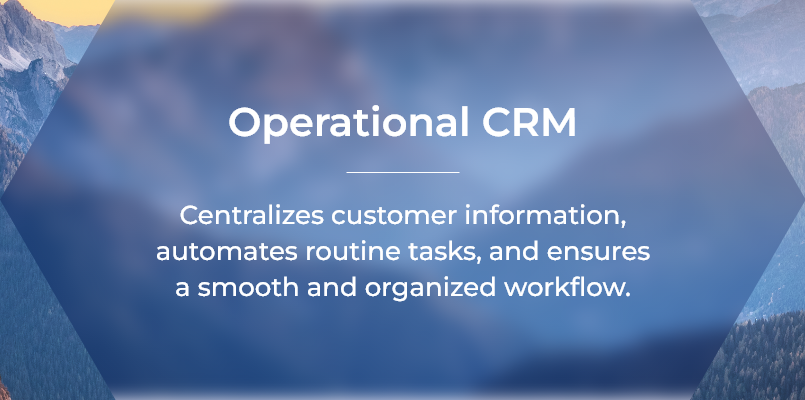
Operational CRM is a must-have for businesses looking to streamline and automate day-to-day customer-facing processes. It focuses on improving the efficiency of tasks related to sales, marketing, and customer service. It ensures a smooth and organized workflow.
By automating routine processes, Operational CRM not only enhances efficiency but also frees up valuable time for teams to focus on building and nurturing meaningful customer relationships. The result is a more agile and responsive customer-facing operation. Personalized interactions and timely services improve overall customer satisfaction and help gain clients’ loyalty.
How does Operational CRM work?
Operational CRM centralizes customer information, providing a unified platform for managing interactions with clients across multiple touchpoints. It’s also designed to smoothen communication and collaboration within and between departments in your company.
This type of CRM offers marketing, sales, and service automation to free your employees from some of the workload they would otherwise need to manage themselves. It automates routine tasks such as order processing, lead tracking, and customer support, freeing up your teams’ time and resources. With this extra space, they can focus on tasks requiring human interaction such as building customer relationships and providing an excellent customer experience.
Benefits of Operational CRM
Operational CRM offers tangible benefits in terms of efficiency and customer satisfaction. Automating routine processes reduces the likelihood of errors and ensures that teams can focus on delivering personalized and timely services. Additionally, real-time access to customer data enables quicker decision-making and enhances overall responsiveness.
Operational CRM is a cornerstone for businesses aiming to create a customer-centric operation that is agile, efficient, and responsive to evolving customer needs.
Who is Operational CRM for?
Operational CRM is particularly suited for businesses with high customer interaction volumes. Small to medium-sized enterprises, as well as larger corporations, benefit from its ability to streamline processes and enhance team productivity.
It is the go-to solution for organizations seeking to automate repetitive tasks, improve response times, and create a more agile and responsive customer-facing operation.
These three CRM types - Collaborative, Analytical, and Operational - present businesses with a spectrum of tools and strategies to navigate the intricate landscape of customer relationship management. Whether you are aiming to improve departmental communication channels, harness the power of data analytics, or optimize your day-to-day operations, each type serves as a valuable asset by offering different capabilities. In the pursuit of cultivating lasting and meaningful customer relationships, the right CRM is your biggest asset.
The Most Important Features to Think About in CRM
When it comes to CRM some crucial features can help your business establish a meaningful relationship with your customers. These features play an important role in shaping the functionality and effectiveness of all three types of CRM.
Contact management
Contact management lies at the heart of any CRM system. This feature ensures you have access to a centralized database with all the valuable customer information. It helps with creating a holistic overview of clients' interactions with your business and their preferences.
Regarding Collaborative CRM, contact management helps establish seamless communication across departments, ensuring every team can access up-to-date customer data. Analytical CRM, on the other hand, provides a comprehensive dataset for in-depth analysis, while Operational CRM streamlines day-to-day customer interactions.
Lead management
Efficient lead management is a crucial feature for businesses focused on converting prospects into loyal customers. In the context of Collaborative CRM, it ensures seamless collaboration among teams to nurture leads effectively. Analytical CRM uses lead data for insightful forecasting, while Operational CRM improves lead lifecycle management, contributing to increased conversion rates.
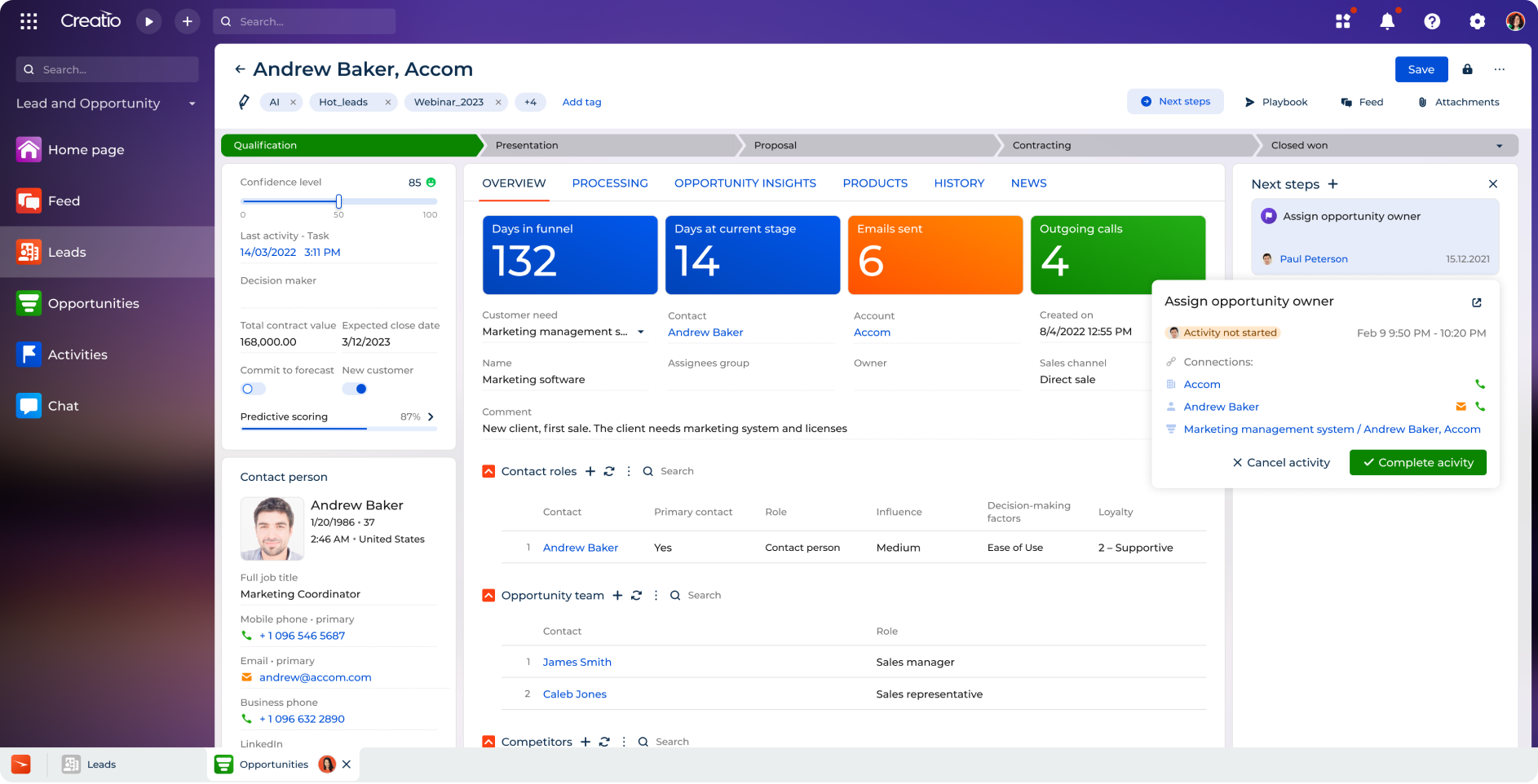
Sales automation
Sales automation is a game-changer in optimizing the sales process. This feature included in the Collaborative CRM, ensures coordination between teams to improve sales efforts. Analytical CRM uses automation to gather insights into customer behaviors. Operational CRM and sales automation enhance efficiency by automating routine tasks of sales professionals.
Pipeline management
Pipeline management is critical for ensuring smooth sales operations. Collaborative CRM employs it to ensure teams share the same perspective. Analytical CRM utilizes it for trend analysis. Operational CRM benefits from streamlined workflows, ensuring the sales pipeline operates at maximum efficiency.
Reporting and analytics
Reporting and analytics provide the data-driven foundation for strategic decision-making. Collaborative CRM offers insights into the effectiveness of interdepartmental collaboration. Analytical CRM generates reports based on advanced analytics of customer behavior. Operational CRM benefits from real-time reporting to enhance responsiveness and overall efficiency of the whole company.
The integral features of the CRM play a distinctive role depending on the CRM type. Each of the features is tailored to meet the specific needs and roles of the Collaboration, Analytical, and Operational CRM. Whether improving collaboration, using data for strategic insights, or automating operational tasks, these features contribute to the management of customer relationships.
How to Choose the Right Type of CRM?
So how can you choose the right type of CRM? There’s no one simple answer to this question as there are many factors you need to consider that are unique to your business. Most importantly, you should focus on finding the solution tailored to your needs and preferences. Just because one type of CRM suits one business doesn’t mean it will be right for your company.
For companies with the need for extensive collaboration among different departments that are struggling with communication, Collaborative CRM may be an ideal fit. On the other hand, for businesses that don’t know how to effectively use their customer data to make strategic decisions, Analytical CRM is the way to go. Finally, companies that want to automate and simplify their customer-facing process might find the Operational CRM to be the best option.
The scale and size of your enterprise are also pivotal factors. Smaller businesses find Operational CRM more suitable because of its simplicity and focus on daily tasks. Usually, they don’t require the extensive capabilities of Collaborative CRM since their employees work closely with each other. However, larger enterprises may require the advanced capabilities of Analytical CRM to isolate more comprehensive insights from extensive amounts of data. They can also benefit from the communication streamlined features of Collaboration CRM that allow their many employees, often scattered around the world, to collaborate efficiently.
If you don’t want to spend hours analyzing every feature and possibility of each type of CRM there’s a great solution that will answer all of your business needs in one. Tired of losing precious employee time by logging on to multiple clunky proprietary systems?
Creatio’s no-code CRM solution is the best option for every company looking to streamline their customer relations without investing in a whole set of tools that don't work in unison with each other. Creatio offers a comprehensive suite, allowing businesses to tailor their CRM approach to fit their unique needs seamlessly within one easy-to-navigate platform. From improving interdepartmental collaboration to routine task automation and advanced analytical capabilities, Creatio has all the features to build sincere and long-lasting customer relationships.
Find out more about Creatio’s CRM and how it can boost your business's efficiency, customer satisfaction, and overall success by providing tailored solutions that align with your specific needs.
No-code technology utilized by the Creatio CRM platform, provides a user-friendly environment for customization without the need for extensive coding skills, ensuring adaptability and ease of use. With Creatio there’s no need to deliberate on choosing the best CRM type, as the platform provides all the important features enabling businesses to improve their collaboration, analytical, and operational capabilities.
Creatio CRM offers a 360-degree view of contact and account data with a complete omnichannel engagement history across the entire customer journey. In addition, Creatio provides end-to-end lead and opportunity management capabilities, as well as collaborative activity management tools to coordinate task management, team collaboration, and much more.
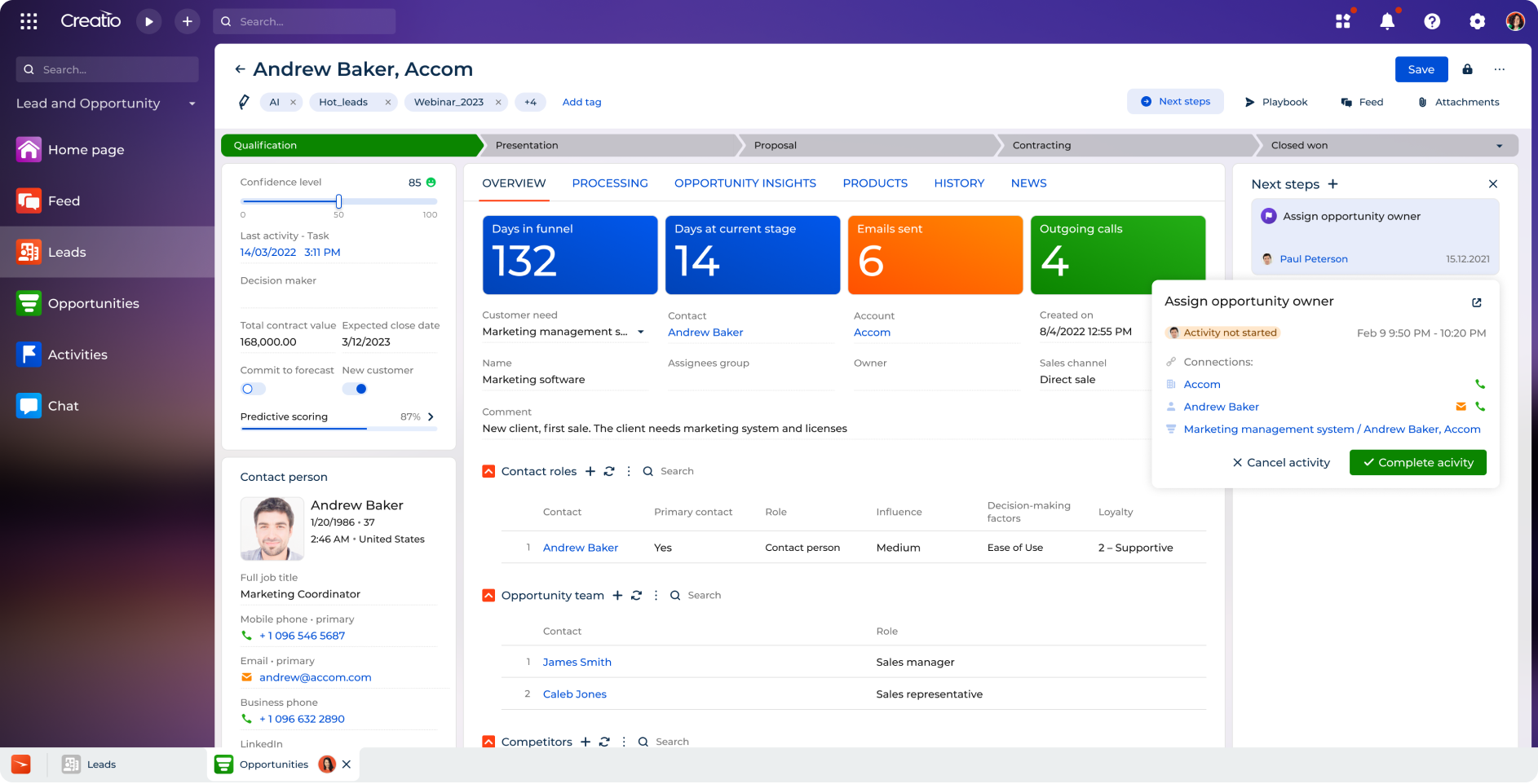
Creatio CRM boasts a robust business process management engine that empowers users to efficiently manage and automate customer-facing and operational workflows of any complexity. This capability extends across diverse business types and industries, providing a versatile solution for streamlining processes and enhancing overall operational efficiency.
The choice of CRM type depends on the intricacies of your business, industry demands, and the scale of operations. Creatio’s no-code CRM solution presents flexible and dynamic tools. They enable you to benefit from the features your business needs and effortlessly customize your CRM for optimal results. It’s a solution worth considering if you are looking for an efficient and versatile tool to improve your customer relations.
Discover how Creatio CRM can cater to your business needs






















































